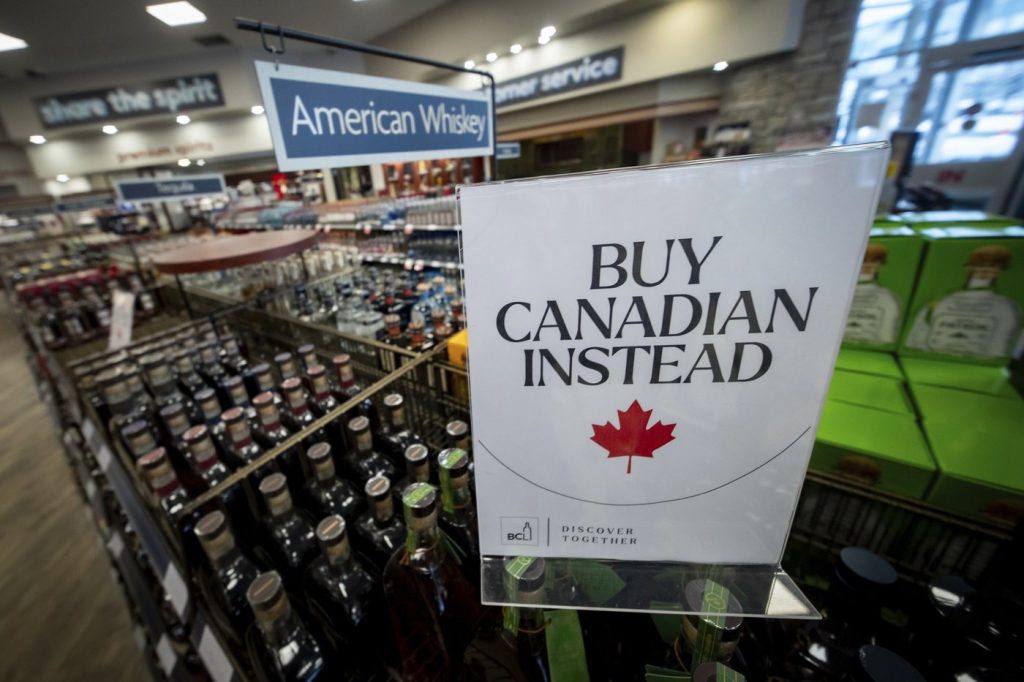LOUISVILLE, Ky. (AP) – Domestic sales for American whiskeys, including bourbon, Tennessee whiskey, and rye whiskey, experienced a disappointing decline in 2024. Factors contributing to this downturn include inflationary pressures that have constrained consumer spending on distilled spirits. The Distilled Spirits Council highlighted that tariffs pose a significant challenge, threatening to diminish sales in critical foreign markets.
Trade tensions with Canada and Mexico are particularly concerning, as they risk increasing the prices of U.S. spirits in these markets. The European Union (EU) presents the largest threat, with tariffs set to resume on April 1 at double the previous rate for American whiskey producers. The trade conflict surrounding steel and aluminum has ensnared American whiskeys once again, which had previously seen a surge in sales in the EU after a 25% tariff was suspended a few years back, according to the council.
The reimposition of tariffs at a 50% rate could severely impact growth in the whiskey sector, harming both large and small distillers across America. Chris Swonger, CEO of the Distilled Spirits Council, stated that such tariffs would be catastrophic and could force many distillers out of their largest export market. The looming tariff concerns cast a shadow over the council's report on 2024 U.S. spirits sales, which indicated a downturn in domestic whiskey sales, with the specifics for each type not detailed.
During the trade disputes of former President Donald Trump’s initial term, American whiskey exports to the EU plummeted by 20%. However, once the tariffs were lifted, exports experienced a robust recovery, surging by 60%. Last week, Canada also imposed initial tariffs on American imports, prompting authorities in various provinces to contemplate removing American liquor brands from government store shelves. These developments reflect ongoing trade tensions that could significantly affect the spirits industry.
Trump has previously mentioned viewing import taxes as a means to secure concessions on issues like immigration while also seeing them as potential revenue sources to bridge the government budget deficit. This context has heightened anxiety among whiskey producers and their supporters, particularly in states such as Kentucky, which accounts for 95% of the world’s bourbon supply. At the start of 2024, a record 14.3 million barrels of bourbon were aging in Kentucky, according to the Kentucky Distillers’ Association.
Boundary Oak Distillery, located in central Kentucky, aims to establish a presence in the EU to supplement its domestic sales across 12 to 15 U.S. states. Brent Goodin, the distillery's owner, expressed efforts to penetrate international markets, sharing that his distillery shipped around 200 cases of bourbon and lavender whiskey to Lithuania and is preparing for exports to Poland and Hungary. However, the looming threat of a 50% tariff could devastate these ambitions.
The spirits industry, comprising producers from all 45 states, acknowledges that American whiskeys represent 63% of all U.S. spirits exports. Producers hope for resolutions in trade negotiations that would protect their products from being caught in the cycle of retaliatory tariffs. Challenges persist in the domestic U.S. market as well; overall spirits sales saw a decline in 2024, falling by 1.1% to $37.2 billion. While volumes increased by 1.1%, the revenue for super premium spirits has also dipped as consumers gravitate toward slightly less-expensive options amid economic pressures.
Domestic sales of American whiskeys dropped by 1.8% in 2024, totaling $5.2 billion in revenue. Conversely, sales of tequila and mezcal grew by 2.9%, reaching $6.7 billion, while premixed cocktails, including ready-to-drink products, saw a significant surge of 16.5%, totaling $3.3 billion. These figures indicate a shift in consumer preferences and reflect a return to normalcy following the sales spikes seen during the COVID-19 pandemic.










